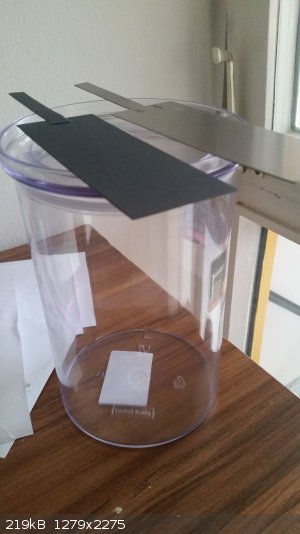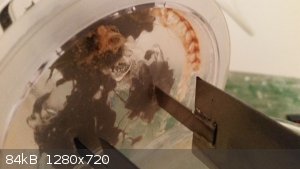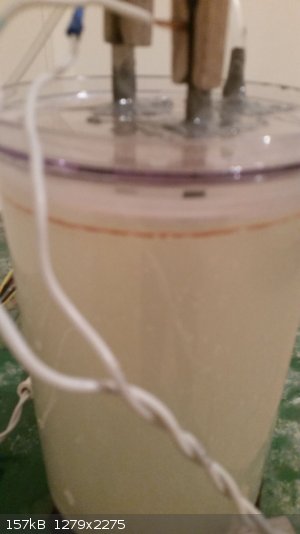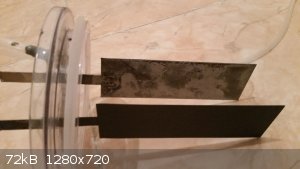| Pages:
1
2
3
4
5
6
7 |
ecos
Hazard to Others
  
Posts: 464
Registered: 6-3-2014
Member Is Offline
Mood: Learning !
|
|
Thanks a lot Nux and Greenlight.
is there any indication to know if the chloride concentration is going down ?
I was thinking about tracking the current consumed by the cell, I think if the chlorate decrease the current intensity will vary and this can be a
good indication to stop the cell rather than waiting for fixed amount of time !
I am planning to buy a shunt resistor and insert it in serious with the electrode. I will be able to read the voltage drop on the resistance to know the current passing
in the cell.
do you think the idea will work ?
![100amp-current-shunt-resistor[1].jpg - 12kB 100amp-current-shunt-resistor[1].jpg - 12kB](http://www.sciencemadness.org/talk/files.php?pid=418167&aid=43246)
[Edited on 3-9-2015 by ecos]
|
|
|
nux vomica
Hazard to Others
  
Posts: 267
Registered: 18-7-2013
Member Is Offline
Mood: No Mood
|
|
You could use one of these.
http://m.ebay.com/itm/Digital-60V-100A-Battery-Power-Analyzer-Watt-Meter-Balancer-For-DC-RC-Helicopter-/190863796444?nav=SEARCH
|
|
|
ecos
Hazard to Others
  
Posts: 464
Registered: 6-3-2014
Member Is Offline
Mood: Learning !
|
|
good tool 
so what would be the current value to stop the cell ? 
|
|
|
macckone
Dispenser of practical lab wisdom
    
Posts: 2171
Registered: 1-3-2013
Location: Over a mile high
Member Is Offline
Mood: Electrical
|
|
You wouldn't use current. You would use amp.hr.
Very cool meter.
|
|
|
ecos
Hazard to Others
  
Posts: 464
Registered: 6-3-2014
Member Is Offline
Mood: Learning !
|
|
it is very interesting to see 1mm coated PbO2 anode : Link
any reason for this high cost ?
[Edited on 11-9-2015 by ecos]
![$_12[1].JPG - 26kB](http://www.sciencemadness.org/talk/files.php?pid=418911&aid=43425)
[Edited on 11-9-2015 by ecos]
|
|
|
greenlight
National Hazard
   
Posts: 763
Registered: 3-11-2014
Member Is Offline
Mood: Energetic
|
|
I have seen those too, they would be good in a perc cell and it would take a while to kill them.
I was wondering the same thing, bit expensive.
|
|
|
ecos
Hazard to Others
  
Posts: 464
Registered: 6-3-2014
Member Is Offline
Mood: Learning !
|
|
I think it can be done easily :
https://youtu.be/bZMWEYiTtso
|
|
|
ecos
Hazard to Others
  
Posts: 464
Registered: 6-3-2014
Member Is Offline
Mood: Learning !
|
|
one of the factors that affect the performance is circulation of the electrolyte. i found that mentioned in this thread.
is it possible to use air bubbler instead of magnetic stirrer ?
|
|
|
ecos
Hazard to Others
  
Posts: 464
Registered: 6-3-2014
Member Is Offline
Mood: Learning !
|
|
Finally I received my MMO plates. I am waiting for The platinum mesh anode and the lead dioxide anodes 

I should connect the dark one to the +ve voltage and the other one to the negative, the question there: what should be the distance between the two
plates?
[Edited on 19-9-2015 by ecos]
|
|
|
hyfalcon
International Hazard
    
Posts: 1003
Registered: 29-3-2012
Member Is Offline
Mood: No Mood
|
|
Aquarium pump with a piece of tubing run to the bottom of the reaction vessel is all you need. Just needs some turbulence to keep fresh electrolyte
moving around the electrodes. This also keeps temperature gradients from being a factor.
As far as distance of the electrodes. This depends on how big your power supply is. How hard are you planning to push them?
[Edited on 20-9-2015 by hyfalcon]
|
|
|
greenlight
National Hazard
   
Posts: 763
Registered: 3-11-2014
Member Is Offline
Mood: Energetic
|
|
@Ecos, where did you order your Platinum mesh and Lead dioxide anode from?
I am still looking for the right one.
|
|
|
ecos
Hazard to Others
  
Posts: 464
Registered: 6-3-2014
Member Is Offline
Mood: Learning !
|
|
I got the Platinum anode from the link you provided me before : Link
for the Lead dioxide anode : Link
fortunately i took the last piece
|
|
|
ecos
Hazard to Others
  
Posts: 464
Registered: 6-3-2014
Member Is Offline
Mood: Learning !
|
|
Quote: Originally posted by hyfalcon  | Aquarium pump with a piece of tubing run to the bottom of the reaction vessel is all you need. Just needs some turbulence to keep fresh electrolyte
moving around the electrodes. This also keeps temperature gradients from being a factor.
As far as distance of the electrodes. This depends on how big your power supply is. How hard are you planning to push them?
[Edited on 20-9-2015 by hyfalcon] |
I am planning to do that using magnetic stirrer since it will make sure all parts of the electrolyte is moving , do you think it would better than air
pump ?
I bought a new PC power supply (350 Watt), it can deliver 10A for 5V. I think this would be good for chlorate cell.
putting the electrodes far away from each other will increase the resistance between the electrode and decrease the current flow. is that desired?
|
|
|
hyfalcon
International Hazard
    
Posts: 1003
Registered: 29-3-2012
Member Is Offline
Mood: No Mood
|
|
No, closer is better. Further apart and you will overheat the electrolyte. Too close and those flat electrodes could warp and short. I usually used
the distance between electrodes to control the temperature.
|
|
|
ecos
Hazard to Others
  
Posts: 464
Registered: 6-3-2014
Member Is Offline
Mood: Learning !
|
|
is there anyway to know the distance so i can have around 8 A current?
would 1" distance be fine ?
|
|
|
ecos
Hazard to Others
  
Posts: 464
Registered: 6-3-2014
Member Is Offline
Mood: Learning !
|
|
I built my chlorate cell and it is operating now.
I started to see the orange colour coming on the surface and near the gas exit.
I started to feel this is not due to corrosion because the electrodes are new and the cell operated for few hours only. I also included pictures for
that(the dark surface is epoxy)


any idea why I have this strange orange surface ?
My cell operates at 3A under 5v. I am not satisfied with this current so I tried to get the electrodes as close as much as I can but now it is 4A and
the electrodes became hot.
I am thinking to add another SS cathode to increase the current or I can increase the voltage to be 12V. I am not sure which option would be better !
[Edited on 3-10-2015 by ecos]
[Edited on 3-10-2015 by ecos]
|
|
|
hyfalcon
International Hazard
    
Posts: 1003
Registered: 29-3-2012
Member Is Offline
Mood: No Mood
|
|
2 smaller cathodes is better than one large one. Better charge distribution.
What are you elctrolysing? NaCl or KCl? If KCl then mag stirring is out. I've had chlorate crystals even try to clog the air tube before. Make
sure you've got your air on full force. In larger reaction vessels, crystal mass falling out of solution can cause problems, especially if you try to
pump or move your electrolyte out of the temperatures in the main vessel. Tubes freeze solid with chlorate crystals. Can be a mess to clean up.
[Edited on 3-10-2015 by hyfalcon]
|
|
|
ecos
Hazard to Others
  
Posts: 464
Registered: 6-3-2014
Member Is Offline
Mood: Learning !
|
|
Quote: Originally posted by hyfalcon  | 2 smaller cathodes is better than one large one. Better charge distribution.
What are you elctrolysing? NaCl or KCl? If KCl then mag stirring is out. I've had chlorate crystals even try to clog the air tube before. Make
sure you've got your air on full force. In larger reaction vessels, crystal mass falling out of solution can cause problems, especially if you try to
pump or move your electrolyte out of the temperatures in the main vessel. Tubes freeze solid with chlorate crystals. Can be a mess to clean up.
[Edited on 3-10-2015 by hyfalcon] |
I have KCl in the electrolyte. I don't use an air pump but I use magnetic stirrer instead.
The magnetic stirrer is 12v computer fan mounted on it a hard disk magnet. It works well.
is there any problems from using mag stirrer?
[Edited on 3-10-2015 by ecos]
|
|
|
hyfalcon
International Hazard
    
Posts: 1003
Registered: 29-3-2012
Member Is Offline
Mood: No Mood
|
|
As your electrolysis continues chlorate will fall out and foul your stirrer.
|
|
|
ecos
Hazard to Others
  
Posts: 464
Registered: 6-3-2014
Member Is Offline
Mood: Learning !
|
|
Ahaa. Good point.
If this is the only reason then i can manage to solve this.
I will buy a small pump and try to connect it.
But would the ciculation of the electolyte disturb the gas formation on the electodes??
|
|
|
ecos
Hazard to Others
  
Posts: 464
Registered: 6-3-2014
Member Is Offline
Mood: Learning !
|
|
please support
One day passed and nothing participated in my cell.
this is the procedure I followed.
1- I added 600 gram of KCL to 2.5 liters of tap water (it was normal cold water, I didnt boil)
2- I used PC power supply , I used the 5 v terminal. it supply 3A.
The MMO rode is connected to the +ve terminal , The platinum is connected to the -ve terminal
3- after the electrolyte became warm , I kept adding KCL (another 250 gram were added)
4- I used magnetic stirrer to circulate the electrolyte.
5- I found the voltage of the PC supply dropped to 3.5 v and the current was 5A now.
I use cheap power supply this is maybe the reason the voltage is dropping in it with time.
I measure the PH and it is between 5 and 6. I don't know why it is like this 
I can't see any kind of participation till now  and I feel disappointed and I feel disappointed
[Edited on 3-10-2015 by ecos]
[Edited on 3-10-2015 by ecos]
|
|
|
ecos
Hazard to Others
  
Posts: 464
Registered: 6-3-2014
Member Is Offline
Mood: Learning !
|
|
After one and half day. I stopped my cell and tried to see if anything would participate but nothing till now.
what concern me is the electrode state, the cathode (platinum) looks darker and has dark region on it ! any reason for that ?

|
|
|
Deathunter88
National Hazard
   
Posts: 545
Registered: 20-2-2015
Location: Beijing, China
Member Is Offline
Mood: No Mood
|
|
Quote: Originally posted by ecos  | I think we have a lot of factors affecting the efficiency of chlorate and perchlorate electrolysis :
1- electrode material -- platinum is the best
2- PH -- should be around 6.8
3- Temperature
4- ultraviolet rays affect the synthesis.
5- circulation of the electrolyte
6- current density
7- Pressure
..... etc !
wow  this amaze me a lot. I thought the process is very easy but now I realized
how many details we need to care about to have efficient cell this amaze me a lot. I thought the process is very easy but now I realized
how many details we need to care about to have efficient cell |
The process is easy, if you don't mind sacrificing some efficiency. By the looks of it, you haven't done any of this before, so I suggest you just
order the electrodes and go for it. Then learn from your mistakes. Once you start you realise that a lot of the things on your list is out of your
control and so you have to accept it. Even is difference in efficiency of 50% is not a big deal, seeing as we are amateur chemists. Instead of say
running it for 2 days you run it for 4 days, no biggie.
Here is a handy calculator to calculate how long to run your cell.
http://www.vk2zay.net/calculators/?body=chlorates.php
One last thing, I feel that thermal decomposition of chlorate to perchlorate to be faster (although less efficient). I'll leave finding out how to do
that as an exercise to not rely on others so much. 
|
|
|
ecos
Hazard to Others
  
Posts: 464
Registered: 6-3-2014
Member Is Offline
Mood: Learning !
|
|
I already got the electrodes , please check previous posts and pictures.
I also used mag stirrer for electrolyte circulation.
I have HCl for PH control
The temperature was around 50 degrees.
I think i ask for solution of my problem not homework !
|
|
|
ecos
Hazard to Others
  
Posts: 464
Registered: 6-3-2014
Member Is Offline
Mood: Learning !
|
|
I noticed that no chlorine gas is coming out of the tube i mounted on the cover of the cell.
I put the terminal of the tube in water and i cant see any air pupples coming out!
Would the chlorine gass dissolve back in the cell??
When i open the cover of the cell i start to smell chlorine!
Any suggestions?
|
|
|
| Pages:
1
2
3
4
5
6
7 |